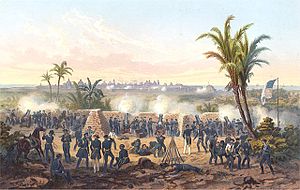Siege of Vera Cruz
| Siege of Veracruz | |||||||
|---|---|---|---|---|---|---|---|
| Part of the Mexican-American War | |||||||
 Scott's siege guns were in place on ground outside the city |
|||||||
|
|||||||
| Belligerents | |||||||
|
|
|
||||||
| Commanders and leaders | |||||||
|
|
|
||||||
| Strength | |||||||
| 8,600 | 3,360 | ||||||
| Casualties and losses | |||||||
| 13 killed 55 wounded |
80 killed or ~350 killed ~50 wounded |
||||||
| Civilian Casualties: ~100 to 500 killed | |||||||
The Battle of Veracruz was a 20-day siege of the key Mexican beachhead seaport of Veracruz, during the Mexican-American War. Lasting from March 9–29, 1847, it began with the first large-scale amphibious assault conducted by United States military forces, and ended with the surrender and occupation of the city. U.S. forces then marched inland to Mexico City.
After the battles of Monterrey and Buena Vista, much of Zachary Taylor's Army of Occupation was transferred to the command of Major General Winfield Scott in support of the upcoming campaign. That campaign, determined by Scott and other Washington officials, would be a Veracruz landing and an advance inland. Mexican military intelligence knew in advance of U.S. plans to attack Veracruz, but internal government turmoil left them powerless to send crucial reinforcements before the American assault commenced.
Veracruz was considered to be the strongest fortress in North America at the time. Brigadier General Juan Esteban Morales commanded a garrison of 3,360 men which manned three major forts guarding Veracruz:
The Americans arrived at Anton Lizardo, Veracruz in early March. Scott agreed with Conner's suggestion for a landing site at Collado Beach, 3 mi (4.8 km) south of Veracruz. The 1st Regular Division under Worth was chosen to make the landing first, followed by Patterson's volunteers and then Twiggs' regular division.
Conner's Mosquito Fleet moved to within 90 yd (82 m) of the beach to supply covering fire if necessary. By 12:15 pm on 9 March, this force was off Collado Beach, followed by larger vessels over the next three hours and a signal for landing the surfboats at 5:30 pm. Just before the main force touched the beach, a gig dashed ahead, and General Worth with his staff jumped ashore. Worth's whole division landed without firing or receiving a single shot. By 11 pm, Scott's entire army had been brought ashore without a single man lost, and the first large scale amphibious landing conducted by the U.S. military was a success.
...
Wikipedia
